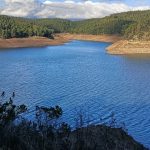By Tracy Burton
Launching your first vlog while rebuilding a property and single-handedly taming a sprawling, hillside plot is a far cry from the relaxed lifestyle most Algarve immigrants seek.
Fortunately, Andrew Crowson thrives on hard work and new challenges. When the former designer and illustrator from London bought the 60,000 m2 quinta near Benafim, he had already renovated three houses in the Algarve.
“The house looked very grey and concrete, but all I saw was the cork trees and a property set back from the road,” he recalls. “It was a moment of ‘love it, that’s the one’.”
The house had been empty for forty years and lacked water and electricity, but Andrew knew he had found his dream home in the perfect rural location. Unfazed by the enormity of the project, he completed the purchase in December 2020 and moved onto the land, living in a leaky 39-seater coach until relentless rain forced him to move into the equally bleak but drier house.
Between making his new home just about habitable, erecting 350 metres of fencing, repainting an old tractor and walking his dogs Will and Burt, there wasn’t much time to watch Portugal-based lifestyle vlogs.
Inside his renovation property Andrew’s restored tractor and coach
In fact, at first Andrew was only recording what he was doing because he regretted not filming key moments during previous renovations. “My memory isn’t great, so I thought if I just videoed everything I could go back and check things whenever I needed to.”
Friends suggested Andrew’s experiences might prove helpful and interesting to others who were embarking on a similar journey. Slowly, the idea for Real Algarve Living took root: a YouTube channel which documented his journey living in the Algarve, chronicled progress on his renovation project and land, and introduced others to inland Algarve and life away from the popular tourist areas.
“I started videoing in March and April, but there’s a big leap from doing it personally and putting yourself on YouTube,” he says. “I had no experience in editing and I spent about two weeks doing the first three or four and then uploading that first video.”
Recording the introduction to his channel was particularly daunting. “Standing in front of that camera and talking to it feels alien because you’re not talking to anyone. I didn’t know what to say. Then you listen to it and you realise you’ve never heard your recorded voice before, never seen yourself in moving pictures. It’s really funny.”
“The moment my first vlog went live was both exciting and surreal – I watched it through my fingers. You’ve gone from being very private to suddenly sharing your world and all your mistakes. You are now open to criticism and, of course, will anyone be interested?”
Fortunately, Andrew is a natural and enthusiastic communicator who comes across well on screen. “The point of my channel is not to give advice to anyone, it’s just my little journey and all my flaws,” he insists.
While most of his building knowledge comes through his experiences in the Algarve, his interest in making things goes back to his childhood when he was inspired by his father.
“My father was head of construction at Willesden Technical College and he was able to do everything, including making cabinets and tables. I don’t remember being taught, but as a child, you pick up what you’re seeing.”
In fact, John Crowson received the Freedom of the City of London for his work on the gold gilt ceiling of the Guildhall.
“When I moved out here, it was an opportunity to somehow recapture something that I may or may not have aspired to when I was younger.”
Any skills the young Andrew picked up from his father will be a huge help now as he prepares to remove the roof of his latest property, reducing it to a shell before starting the rebuild in earnest. With so much renovation work pending, wouldn’t it have been easier just to buy a ruin?
“What is and isn’t a ruin?”
“Does it have to be rubble on the floor?” Andrew asks. “I bought previous houses thinking they weren’t ruins, but by the time you’ve taken the roof off, it’s essentially a ruin. Look at this house. I have no lintels above the front or back door and none above the windows. By the time I have taken the roof off, removed the internal walls, and the windows and the doors, you’re left with four walls.”
It’s the specific way he’s tackling the project which makes Andrew’s vlogs such compelling viewing. He is in no rush to finish the renovation, preferring to focus on doing things properly. He waited three months for mains water and seven for mains electricity; until then, he used a local watering hole and charged his phone at brother James and sister-in-law Cristina’s nearby home.
Comfort in a temporary abode
Andrew believes it’s important to create a pleasant environment in which to live while the renovation work continues. It makes for a healthy mind and balance. “I learnt that the hard way,” he adds.
The now watertight coach will be his home for the foreseeable future. After moving it up and down the garden several times, it is now parked closer to the property. Andrew has created a pretty lighted seating area with sofas and bright cushions next to it, providing temporary shelter from the sun, wind and rain. An outdoor shower (completed in November) means he no longer has to bathe in cold water.
Vlogging success
Andrew has now posted more than thirty vlogs; his dedication is paying off and he has over 4,000 subscribers from America, Canada, South Africa, Spain, Italy, Portugal and the UK. His viewing figures are increasing every week.
Recording daily footage for his vlog has become second nature, though he admits to spending a ridiculous amount of time filming and editing while working on his property. “I’m literally living and breathing the vlog, but I’m gradually getting better and faster at it. When you see people enjoying it and writing lovely comments, I feel like I’m part of a community and that gives me even more enthusiasm.”
Andrew’s Tips
1 Use an independent solicitor who will arrange a topographic survey to determine property boundaries.
2 Check the plans (if the owner doesn’t have them, ask to see them at the local câmara) – if it’s not urban land, you probably won’t get permission to build.
3 Get a structural survey – unless it’s only the land you’re interested in and you don’t mind if the property collapses.
4 Make an offer but never sign a promissory agreement until all paperwork is in order.
5 Know what you want to do and what you want to achieve; set your goals and work towards them.
7 Do as much as you can, but use experts for specialist jobs, e.g. roofing.
Andrew’s YouTube channel is Real Algarve Living
Instagram: realalgarveliving















